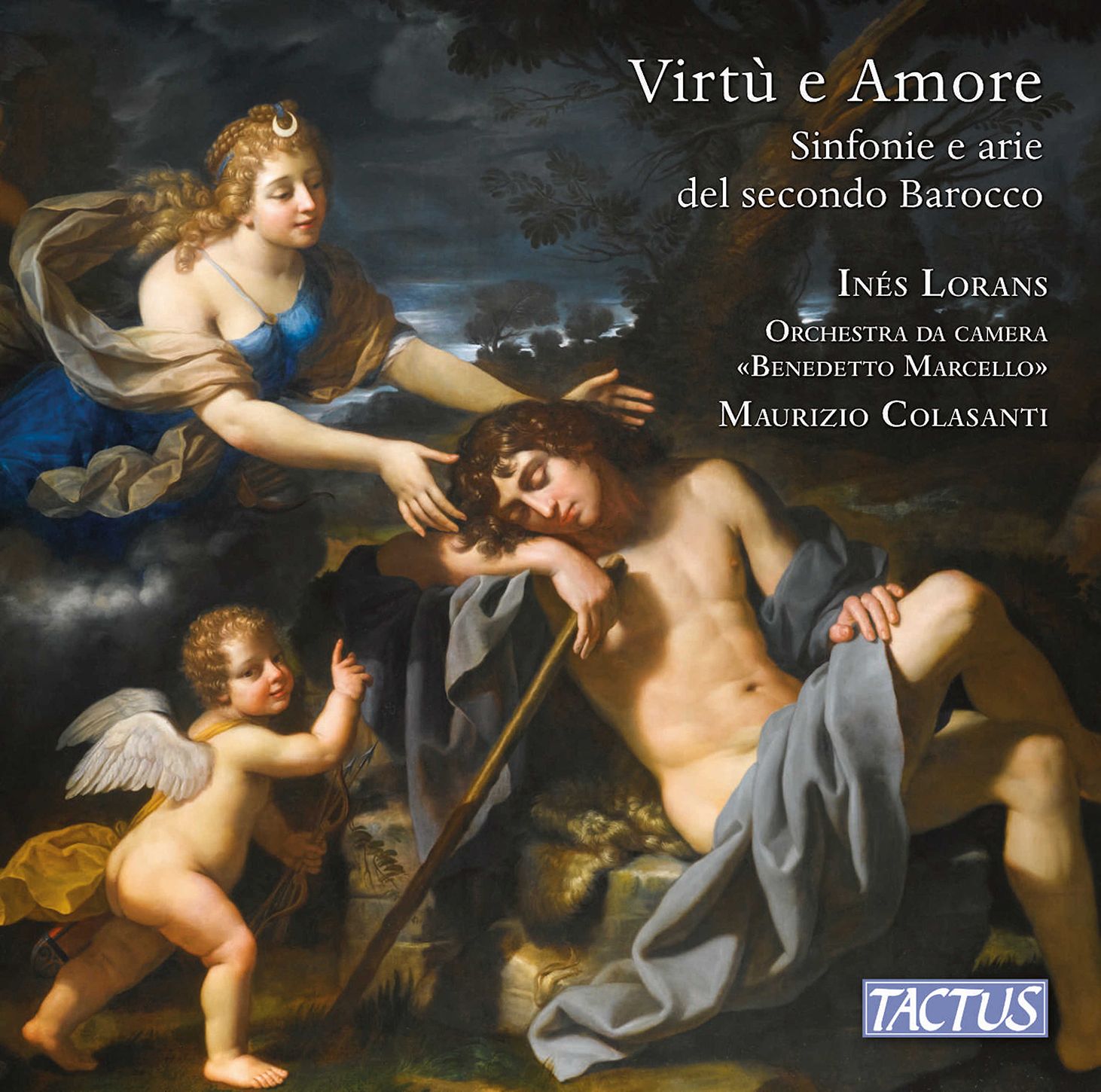Virtù e Amore: Music of Il secondo Barocco
Virtue and love: two vital aspects of Baroque thought and emotion

Virtue and love: two vital aspects of Baroque thought and emotion, are explored here in this wide-ranging programme of composers from the so-called "secondo Barocco" (the late Baroque period, in other words). Virtue and love enjoy a volatile relationship, sometime supportive, more often perhaps in conflict.
"Virtue" in Baroque parlance speaks of a link between the human and the Divine. Interventions by Gods and Goddesses are frequent in Baroque opera, for example. This disc seeks to explore these dynamics via names both well-known and ones that should be better-known. Inès Lorans is the soprano with the Orchestra da Camera "Benedetto Marcello," a small group of two first volins, two seconds, and one each of viola, cello, double-bass and harpsichord.
The latter intervenes in the vicissitudes of human beings, helping them to get over grief, oppression, weakness, loss of love and illusion, and bringing them closer to good and truth. From the magnificent aria of the Polyphemus by Nicola Porpora, passing through Vivaldi and Handel to Niccolò Jommelli, the soprano Inés Lorans accompanied by the chamber orchestra “Benedetto Marcello” conducted by Maurizio Colasanti, faces this various florilege of baroqu , whiche arias in a live recording, completed by two Symphonies by Carlo Tessarini and Francesco Araja.
The small-scalw Chamber Orchestra "Benedetto Marcello" is beautifully stylish. The recordings are live, which adds to the frisson: from the Collegiata di Santa Maria Maggiore, Guardiagrele, (Chieti), on December 28, 2018.
We begin with Aci's famous prayer of gratitude for immortal life, "Alto Giove," from Porpora's Polifemo (1735). An extended aria (some nine minutes), it is incredibly expressive. here's Lorano:
And here's Rousset's version:
We met Porpora previously here (where again I quoted the "Alto Giove" above). the very next aria brings in a real plea for more Vivaldi opera. Shamelessly neglected in comparison with Handel's output, there appear to be discoveries upon discoveries in his scores. Here, it is "Anche il mar par che sommerga" from Vivaldi's Tamerlano (originally called Bajazet and more famous under that name). Idaspe's aria, heard here, had actually appeared in a previous Vivaldi opera (Semiramide). The aria has the most delicious slow section; listen to the mellifluous lines:
The Handel Alcina aria might be more familiar ("Tornami a vagheggiar," 1735, sung by the sorceress Morgana) but is worth quoting for Lorani's impressive vocal cadenza at the end:
It is balanced by a lovely version of the most famous piece on the disc: "Lascia ch'ia pianga" from Rinaldo)
The Overture to La Stravaganza. Op. 4 by Carlo Tessarini (1690-after 1766, also known as "Carlo Tessarini da Rimini") is rare. This composer is new to Classical Explorer; if known for anything it is more likely to be his violin concertos. While this might not be the most disciplined performance from the upper strings, it is good to hear. Let's hear the sprightly Presto finale of this three movement Overture:
Interesting to hear an aria by Niccolò Jommelli (1714-74), a composer new to Classical Explorer, but in all probability this will not be his last appearance: his opera Il Vologeso has just been recorded by Ian Page and The Mozartists for Signum and is hot off the press, with a cast including the spectacular Jennifer France as Flavio. Jommelli set librettist Metastasio's La Dinone abbandonata no less than three times (!) - this one is from the second version. This is Aeneas' "decision" aria in which he opts to return to Carthage, despite the pain this will cause Dido in "Ah non sai, bella Selene". the second version was praised by Metastasio himself for its grace and expressive harmony in this expansive (9-minute) song:
The second instrumental/symphonic interlude is a Sinfonia by Francesco Araja (1709-c. 1770), also seen as "Araia". This Sinfonia in D is seen in the context of this disc as portraying virtue becoming love. Let's hear the lovely slow movement:
The disc should - and does - end vocally, however. And we end with Handel: how could we not? This greatest of Baroque composers wrote operas and oratorios that span the whole gamut of human experience. Here, it is an excerpt from a dramatic oratorio, Il trionfo del Tempo e del Disinganno (“The Triumph of Time and Disillusion”) that seals the deal. It is the perfect choice, given that the plot centres around the Virtues. As Susanna Rigacci says in her excellent notes to this release, "After being troubled by a deep inward conflict, Beauty ends up by cursing Pleasure and is converted. She sings "Tu del ciel ministro eletto," a prayer addressed to the angel sent to her by God in order to ensure her conversion. This represents the ultimate triumph of virtue, which overcomes and dominates human weakness." How infinitely touching this is:
